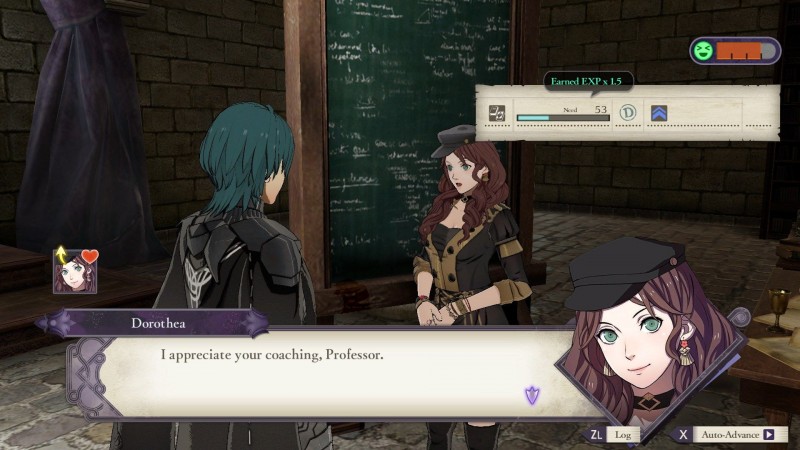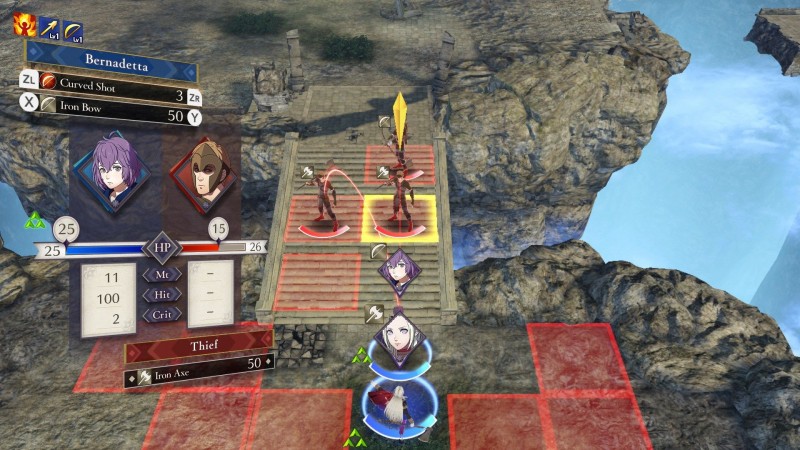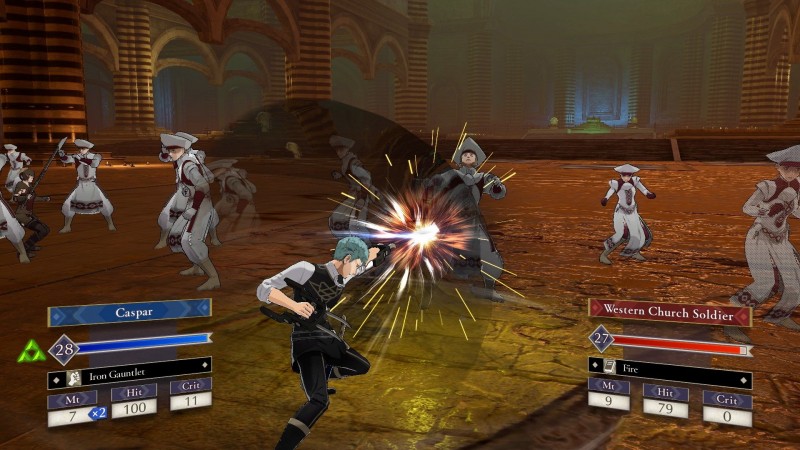With big branching paths and plenty of systems to explore, Fire Emblem: Three Houses is a massive game. As a professor, you’ll need to prepare your students for success on and off the battlefield, especially as conflict heats up and things inch toward war. After reviewing the game and logging time well into my second playthrough, I’ve become a well of knowledge in how to best use your time and what you need to keep in mind to put your best foot forward. Here are some tips to make the big journey less daunting.
Choose Your House Wisely, But Don’t Fret Too Much Over It
Here’s what it really comes down to: You will be spending a lot of time with the members of your selected house, especially the leader. Keep this in mind as you make your selection. There is no right or wrong choice, but the game is heavily focused on the members of your house. You can recruit and get to know characters from other houses, but it takes a little more work as you must impress them with your skill level as a professor. From what I’ve experienced, all the houses seem pretty balanced, with their share of interesting characters and challenges you need to help them overcome to grow.
The leaders of each house have a more prominent role in the story and how the events unfold, so make sure to pay attention to their leadership style and political views. Dmitri is more power hungry and by the books. Claude’s strategy is to stay neutral and ease people with his laid-back demeanor. Edelgard is determined and always looking toward progress. No matter your choice, interesting conundrums will come your way and you will have to take sides as tensions brew. Just know the game is meant to be played through more than once to see all sides to the story, and paths can be very different depending on your choices.
For more, check out our feature that gives more insight into the members of each house to help you decide.
Get The Most Out Of Your Students
The routine of a school schedule means it’s easy to plan your time on the calendar each week. Your weeks are spent instructing students with lessons, answering their questions, and then choosing on your free day whether to build relationships on the monastery grounds, take them into auxiliary battles to level up, send them to seminars, or let them rest. The latter I used as rarely as possible, but beware that your students’ motivation will dip (meaning you can’t build their skills with private lessons) if you don’t let them rest or pile on the social time or gifts.
Every week, you see if there are special events, such as bigger boosts from dining with students or special monster hunts that distribute great experience and rewards. You can only pick one thing to do on a free day each week: explore, battle, seminar, or rest, so you need to keep this in mind. You want to get a good mix of all of these throughout the calendar month. Always explore after a big story mission and be sure to put your students into extra battles, so you can raise their levels and obtain new skills. Seminars can be very useful for also improving the skills of students, but you need to really assess if they’re worth your while. Every professor has a level and two areas of expertise. Students who go to seminars are pre-chosen, usually based on their area of study. However, many times a few sneak in that feel like a waste to send. Honestly, I felt doing battles helped much more in terms of advancing their skills and levels, but there were a few times I did seminars when it benefited multiple students in areas I wanted to advance to unlock specific classes.

Invest In The Right Skills For The Class You Desire
Fire Emblem: Three Houses gives you a lot of flexibility over how you build your characters. You have control over their classes and the weapons they wield. First off, having students proficient in multiple weapons is a good idea; the more options you have at your disposal on the battlefield, the better. I loved having combatants who could wield both swords and bows, giving me up-close and ranged attack options. You can always see what rank you need in certain areas to make your students eligible to take their exam for a specific class. I suggest after you pass each certification to advance class types; you decide ahead of time what you’d like for the next level for each character. This allows you to use your lessons, seminars, battles to build those skill requirements, without wasting your time in the wrong areas.
Explore and Talk To Everyone In The Monastery After Main Missions
After every mission, new dialogue and side quests open up if you choose to explore the monastery. Do this immediately. It allows you to gather up all the side quests (some are limited-time) and decide when in the coming weeks you want to do them. Socializing is important, and new dialogue options often come up that can boost your relationship levels (if you pick the right one). Exploring also gives you the chance to sit down to meals, have tea, garden, and fish, which all help in various ways. Improving relationships, investing in saint statues for faster growth, and harvesting seeds that often produce valuable gifts like flowers are just some of the opportunities that come with exploring the monastery.
The monastery also has tons of hidden goodies found by searching the premises. You can discover stuff like books and lost items; the former can raise your professor level, while the latter gives you a way to boost your relationships if you return them to their owners. Also, you should be constantly giving students gifts to increase your relationship. Not only does raising their relationship level benefit you in battle with them more likely to help out, but it also rewards you with some cool scenes in terms of character development.

Take On Extra Missions To Level Up And Open New Shops
Mentioned previously, side quests often open up after main missions. Some are simple fetch-quests that give you extra items, but others (usually those that require you to step onto the battlefield) unlock great bonuses, such as new battalion options and new shops. The extra shops can be really valuable, selling materials for weapon upgrades and repairs alongside gifts that give large boosts if you give them to the right person. Which reminds me: Pay close attention to the characters’ personalities and their interests, so you can get the most out of your gifts.
The other benefit to doing extra quests is being able to level up your combatants quickly. I used these opportunities to play some of my lower-leveled characters to ensure they’d be ready in case I needed to adjust my strategy or lost one to permadeath. Also, as a bonus, paralogues unlock some scenes between the students that lend more to their backstory and host some interesting battles.
Visit The Blacksmith Often
If you’ve played other Fire Emblem entries, you know the value of the smithy. Weapon durability is alive and well in Three Houses, and you always want to be crafting better weapons. The material your weapons are made out of can factor into how much damage certain enemies take. With the classic weapon triangle gone, it’s more about the enemy type you’re facing, and some are more susceptible to certain elements than others, meaning it’s in your best interest carry both an iron and steel sword. Keep an eye on how many uses are left on each weapon before heading into battle. Nothing is worse than having a weapon break and feeling the sting in your lessened attack power.
Invest In The Saint Statues
After the game’s introductory segment, you unlock saint statues. Completing quests and doing extra battles nets you renown, which can then be spent to restore four different statues. Doing this gives you various bonuses to your unit’s growth. For instance, all students might get +1 to their bow skills, or gain 10 percent more experience in battle. You can even increase the number of times you can rewind time during a stage. The point is, this is very valuable to invest in, but also easy to forget about. The statues are located in the cathedral on the far right side. Visit and invest in them every so often to make your life easier.

Don’t Forget About Battalions
As I discussed in my review, battalions are one of my favorite additions because they are lifesavers when you’re up against larger, deadly foes. Use them! For each combatant, you can hire and level up these groups of soldiers. They all focus on different classes, from support to archery. Some cause status effects, such as poisoning or staggering foes, but others can provide healing and defensive support. They greatly improve your odds against tougher threats because you don’t risk a counterattack. Many times they were how I polished off enemies without sustaining damage. They are often the answer to getting the most out of your turn. Remember though, if you take too much damage your battalions will retreat and you will be unable to call on them for help.
Keep Multiple Saves
Fire Emblem: Three Houses has its share of branching paths that go well beyond your house choice. Thankfully, the game lets you know when you’re making a decision that will drastically change the outcome of the story. Keeping saves at these points is a good idea if you’ll want to go back later and see how things would have turned off differently. It will keep you from always wondering what might have been, and they’re good to have in the off chance you regret your actions. Once you complete one playthrough, you gain access to New Game Plus, where you keep your renown and hired battalions. You can also unlock support levels and combat skills that you had in your previous game. Point is, it’s great to have an extra save just in case you decide you don’t like how you spent your day, or even for seemingly minor decisions like if and who you romance.
Turn Back The Hands Of Time
I’m just going to say it. Fire Emblem: Three Houses brings a new intensity to permadeath. After all, nothing says you’re a failed teacher quite like letting your student die on the battlefield. Even with the combat forecast and danger radius, sometimes you just miscalculate your actions or luck isn’t on your side. Even with permadeath turned off, if you lost a unit early in battle, it means they can’t level up as much. Instead of having to reload to change your fate, you have a get-out-of-jail-free card in the Divine Pulse. This feature lets you reverse time and change the course of your actions. Beware though, it’s limited in how many times you can use it each battle, although you have some options as the game goes on to increase this number. Trust me, you’ll want to use this instead of pressing the reset button since some fights can go on for upwards of an hour.
